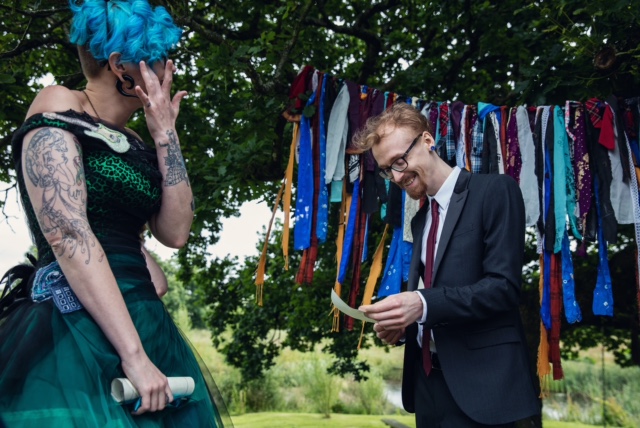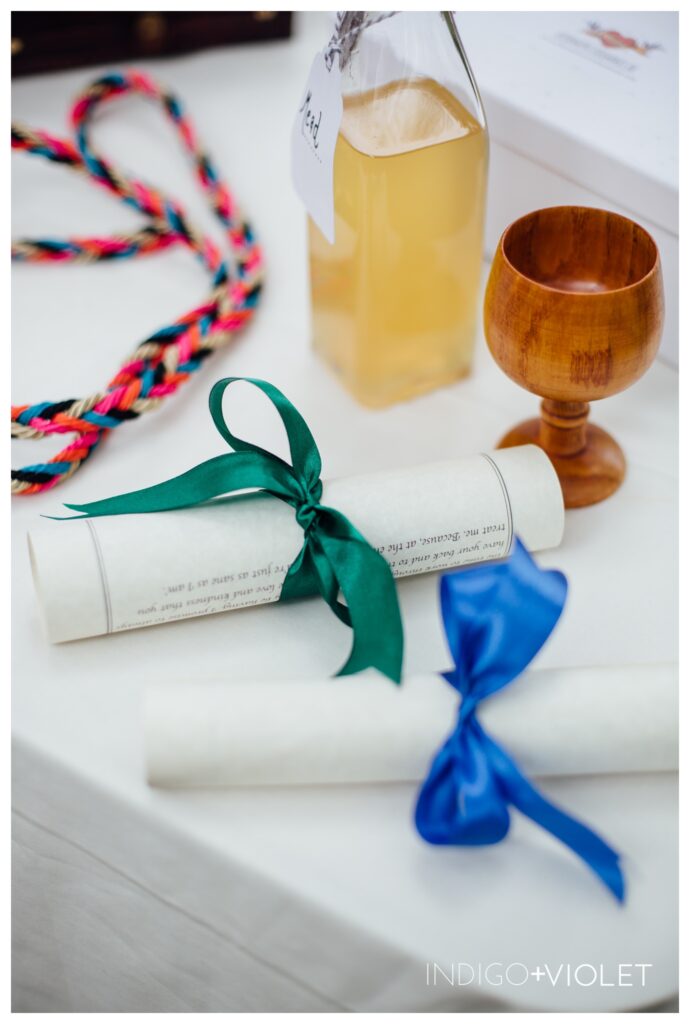‘We want to say our own vows, but don’t know what to write’ is something I hear couples say when talking about their wedding ceremony. Where do you start, what do you write, and what are you supposed to say to each other? Below is some information on writing wedding vows and what you might want to include to make your wedding ceremony personal.
why are wedding vows said?
Wedding or marriage vows are public declarations stated between two people, in front of witnesses to their words during a marriage ceremony. Marriage vows are legally required to be said and heard in front of two people only (there are usually more present but only two are noted as being witnesses).
Though there are now variants to the below traditional civil marriage declaration said and heard in a licensed marriage venue in the presence of registrars, these are the standard marriage declarations or marriage vows.
I do solemnly declare that I know not of any lawful impediment
why I, (name) may not be joined in matrimony to (name).
I call upon these persons here present, to witness that I, (name) do take thee (name) to be my lawful wedded wife /husband.
Words used in Christian marriage ceremonies are:
I, (name), take you, (name)
to be my wife/husband,
to have and to hold
from this day forward;
for better, for worse,
for richer, for poorer,
in sickness and in health,
to love and to cherish,
till death us do part,
according to God’s holy law.
In the presence of God I make this vow.

All of us are potentially familiar with these words; said by every couple in marriage ceremonies in most parts of Britain. Do these words relate to you as a couple? Do they portray your feelings to each other; your hopes for your future lives; your relationship? If your answer is no, why would you say them on your wedding day? Your wedding vows, made during your wedding ceremony, should be relevant to you as a couple. They should be centred on your feelings towards each other, your promises for a combined future together, and thoughts appropriate to your relationship.
the Difference between a Marriage and a Wedding ceremony
A marriage is a legally recognised partnership between two people who are eligible to be legally married according to the criteria governed by UK law. Currently to be legally married in England or Wales the marriage ceremony must take place is a licensed venue and be carried out by a registrar or by a registered religious leader. A marriage is an agreement and those within a marriage aren’t required to be in love with each other.
Certain words must be stated and heard during a marriage ceremony, and no religious or spiritual content is allowed to be said during the part of the ceremony when the legal declarations are stated. Some legal marriages do now allow personalised content and unity ceremonies as celebrants use, but these must not take pace until after the legal part has happened.
In contrast to religious or civil marriage ceremonies wedding celebrants create and lead wedding ceremonies which are centred on the love and relationship of those the ceremony is for. Choosing to have a celebrant conduct your ceremony allows you to say your own vows. Celebrant wedding ceremonies are personal, bespoke and unique to each couple. A celebrant will work with both of you, and help you create special meaningful wedding vows. This can be done together with both of you knowing what will be said, or separately to keep secret until your wedding day.
Celebrant weddings in England and Wales are not legally standing, meaning those who have a wedding ceremony with a celebrant in England or Wales are not legally married during the wedding ceremony with a celebrant. A wedding is a celebration or a relationship and a celebration marking a new stage in this relationship. Weddings are about love.

Writing Wedding Vows that are personal
As an alternative celebrant, I help people who are interested in writing wedding vows to each other. You can say anything you want to say and may want to include important topics and likes from each other. A few sample vows (not example as I never use the same vows twice) include:
‘I promise to click ‘like’ on your Facebook statuses, and not complain about your endless selfies’
‘I vow to not pass comment or judgement on your ever increasing shoe and bag collection’
‘I will continue to support you in your quest to collect Star Wars figures, and understand how Star Wars means to you’
‘I promise to tell you the truth when you ask my opinion on new clothes; no matter what you may prefer me to say’
‘I promise not to complain when you watch the World Cup, European Championships or the Olympics games once every four years’
‘I accept your good points and your bad, your likes and dislikes, and respect your right to have your own opinions, and I ask the same of you’
When you are writing wedding vows, think about combining different promises and subjects on things that matter to you both.
If you have nicknames for each other, use them in your vows. While your wedding ceremony should be about both of you, bear in mind rude nicknames or harsh ones which you don’t want everyone present to hear.
When starting to think about writing wedding vows, first decide how you want to say them. Do you want to read them directly to your other half, or do you prefer to repeat them back? Vows can be serious, romantic, heartfelt, silly or funny. If you aren’t the kind of couple who feel comfortable declaring your personal emotions to each other, you don’t have to, but you can still say meaningful and personalised wedding vows. You can also decide to call them promises and any other title if you do not refer to them as vows.
‘You know how I feel about you, and I promise to continue to be by your side no matter what we may face in the future’
Perhaps you both want to say them together using the words ‘we do’ if nerves are an issue, or you are a shy couple.
‘Jay and Sam, together do you promise to continue to be by each other’s sides no matter what you may face in the future?’
Without a wedding ceremony, there isn’t a wedding day, and your vows are without doubt the most important part of the day. Make them meaningful promises, not just recited words. Writing wedding vows ensures your wedding ceremony is personalised and meaningful to you. Unlike legal marriage vows, you can say anything; serious, funny, romantic, silly or whatever you want to say.





